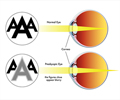Optometrists at the University of Alabama at Birmingham (UAB) have come up with a new breed of contact lenses that can treat presbyopia, a gradual loss of the ability to focus
Presbyopia, a gradual loss of the ability to focus on nearby objects may soon be dealt with by a new breed of contact lenses that has been developed by optometrists at the University of Alabama at Birmingham (UAB).
According to Adam Gordon, O.D., M.P.H., an associate professor in the School of Optometry, bifocal glasses can prove handy, but for those who wear contacts, presbyopia has been an annoying part of aging."There's a huge number of people who don't want to give up contacts due to presbyopia, or don't want to wear reading glasses over their contact lenses," said Gordon, who directs the Cornea and Contact Lens Clinic at UAB Eye Care, the clinical and retail operation of the School of Optometry.
The new multifocal lenses are made with silicone hydrogel polymer, a more breathable and safer material than older soft-lens polymers, Gordon said.
Cutting-edge laser technology is used to manufacture each lens' complex optical designs, which improve focus on nearby objects.
A comprehensive eye exam can spot the early signs of presbyopia.
In addition to treating the condition with eyeglass prescriptions, optometrists traditionally have relied on a corrective technique called monovision - that is, prescribing one contact lens for distance vision and another contact lens for reading in the same patient. Monovision is essentially using non-matched lenses to improve sight.
Advertisement
"In monovision, the two eyes are always doing something different: one eye is always blurry and the brain has to figure out which eye it should pay the most attention to," the expert added.
Advertisement
"They are a closer simulation of the way natural vision works and the way eyes are designed to focus," Gordon said.
Source-ANI











